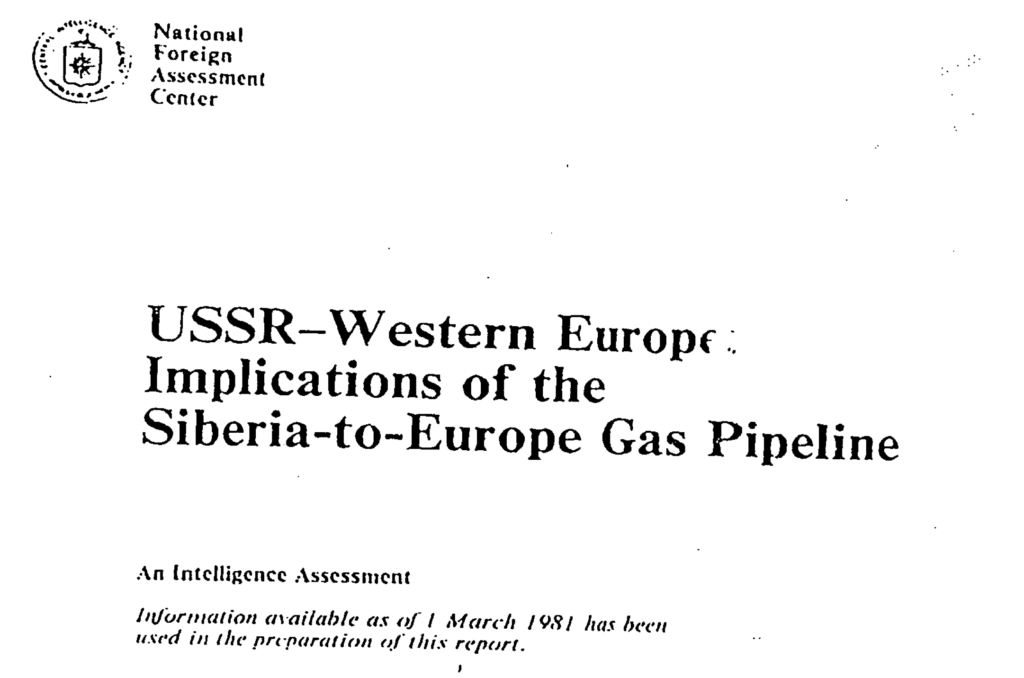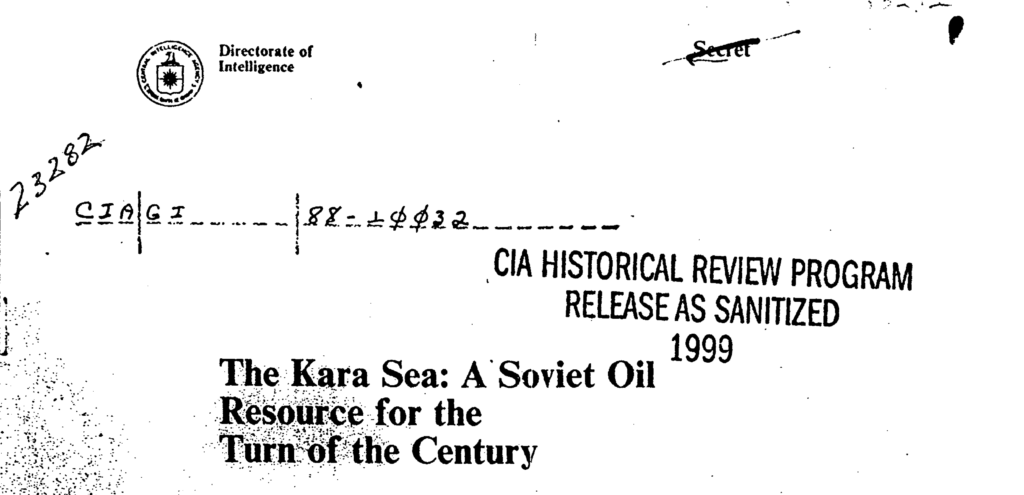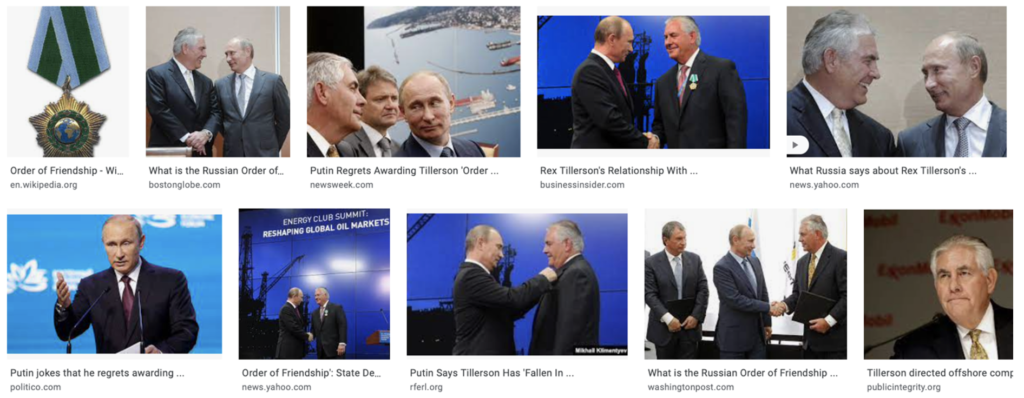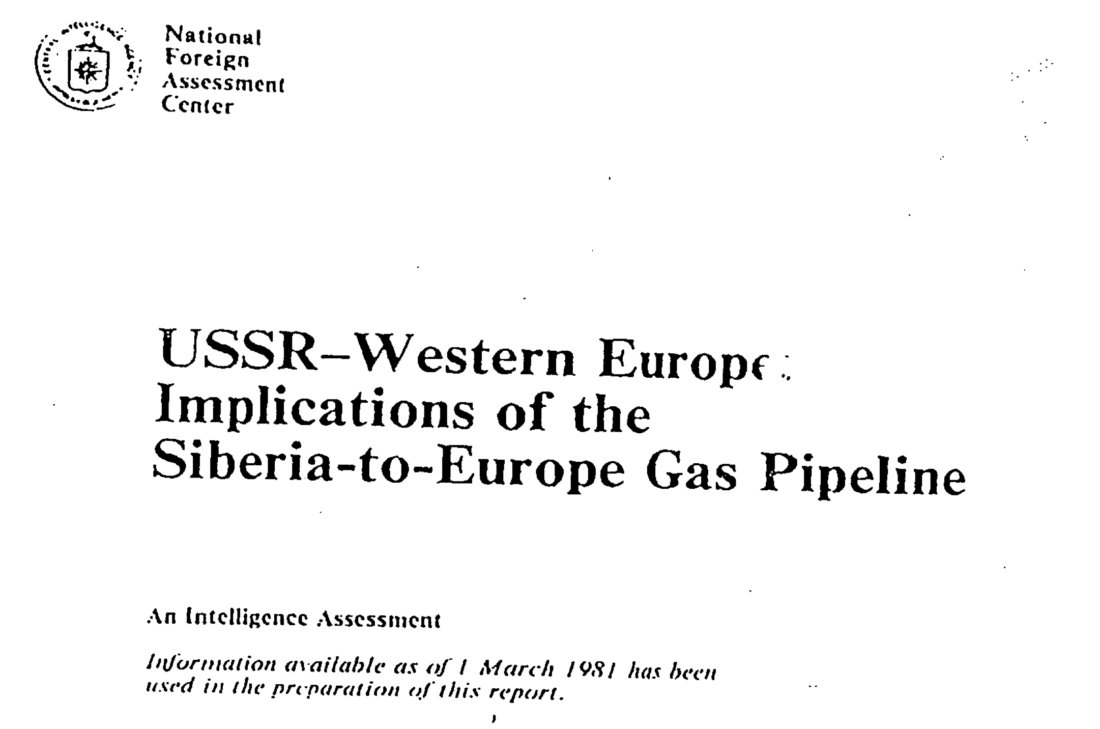An investigation published on March 24 in the Business Section of the New York Times by Hiroko Tabuchi tells the long history of Exxon/ExxonMobil fighting US sanctions against the USSR and Russia – going back to 1981, President Reagan’s first year in office. As the Times story states:
Those efforts, nearly a half-century ago, show how some of the world’s largest oil and gas companies played a critical role in opening up Russia’s reserves by opposing sanctions and advocating for business interests over national security, human rights or environmental concerns.
This is a fascinating, sordid tale of corporate interests being prioritized over national security interests. While that might not be surprising, the details are worth investigating further and there is always more to explore. Especially as Russia’s war against the Ukraine rages on, a conflict that is inexorably linked to Europe’s oil and gas dependence on Russia.
The Times story features a video we copied and tucked away nearly a decade ago when Exxon cut a deal with the Kremlin controlled oil company Rosneft.
Rosneft was extremely proud of the “Strategic Partnership” with the American company. This mega-deal was killed by sanctions passed by Congress and signed by Obama in 2014
We wrote about some of this plot eight years ago, asking the question, “Does Exxon love Putin more than U.S.?” https://climateinvestigations.org/does_exxon_love_putin_more_than_u_s/
1980s Gas Pipeline Sanctions Fight
The Times piece starts with a look at 1970s-80s pipeline being built from Russia through Ukraine to Western Europe. The Reagan Administration thought this project was a really bad idea that would only give the Soviet Union power. Turns out Exxon had a huge financial stake in this pipeline and was part of the corporate army that backed off Reagan. Exxon stood to gain because they held a large stake in many of the gas distribution companies that were set to sell the Soviet gas to various countries in Europe.
Press coverage at the time included The Washington Post “Soviet Gas Pipeline to Benefit Multinational Oil Companies”, by Dan Morgan, February 6, 1982
The $25 billion Soviet natural gas pipeline, a project opposed by the Reagan administration, is destined to benefit not only European consumers but also major multinational oil companies, including U.S.-based Exxon, which have signed up for large volumes of the gas under agreements reached with the Soviets.
As the Washington Post reported, Exxon had a large stake in three ventures that were to divvy up the Russian gas:
On Feb. 15 the supervisory board of Ruhrgas, a huge West German utility in which the oil multinationals have a 65 percent equity interest, is expected to give final approval to the Soviet gas deal that will provide the country with 10.5 billion cubic feet a year starting in 1984.
Ruhrgas has signed up for half of the new gas. Another quarter of it will go to a company called Brigitta, jointly owned by Exxon and Shell. Two other companies, Thyssengas and Gelsenberg, will each get 10 percent.
Exxon and Shell each have a 25 percent interest in Thyssengas, while Gelsenberg is wholly owned by BP. The remaining 5 percent is earmarked for small German companies.”
Exxon kept its stake in Ruhrgas until 2003 after deepening ties to Russian state by buying a piece of Gasprom in 1998.
CIA 1980s intel reports on Russian oil and gas
At the top of the New York Times piece, Tabuchi quotes from a CIA report from the 1980s (declassified in 1999) on the geopolitical risks posed by gas pipelines headed to Europe from the Soviet Union and gas fields on the Yamal peninsula.

Another declassified CIA report we found a couple years ago, examined the vast oil and gas potential of the Kara Sea, north of the Yamal Peninsula where most of Russia’s gas was extracted. The CIA concluded that the Kara Sea resources would empower Russia with great fortunes, but that it would only be possible with the help of a multinational oil company. As detailed in the Times story and below, ExxonMobil cut a deal in 2012 specifically to help the Kremlin controlled Rosneft exploit the Kara Sea. Exxon fulfilled the CIA’s predictions some twenty years after this report.

The Exxon-Rosneft “Strategic Partnership”
Would this deal have been good for the United States’ interests?
Not likely, but it was “strategic” for Russia to be sure.
The April 2012 deal was undoubtedly Tillerson’s biggest accomplishment as CEO, achieving a goal former CEO Lee Raymond couldn’t reach, expanding Exxon’s hold on Russia’s vast fossil fuel potential. The video above proudly proclaims that the world is consuming more oil and gas, and that Russia holds 1/4 of all remaining reserves. The second half of the Times story goes into the history of this deal a bit.
Tillerson’s legacy in Russia is a much longer tale, having spent many years as ExxonMobil’s main man there, navigating the development of the Sakhalin project and partnership with Rosneft (a company Exxon found highly underwhelming in the 1990s). The success of this work set Tillerson up to be CEO and Rosneft will now take full control of Sakhalin as Exxon pulls out of Russia because of Putin’s war in the Ukraine. And so it goes…
The Exxon-Rosneft Strategic Partnership would have secured absolutely massive reserves for Exxon, and likewise helped the Russian oil industry modernize and develop untouchable or at least difficult to develop Arctic offshore gas and oil reserves. Exxon talked about investments of $500 billion. Returns on that investment would have been sizable.
The net gain to the Russian economy, to the Kremlin treasury, would have been much larger and of long term significance, as the CIA warned in the 1980s. Exxon had promised to essentially teach Rosneft how to “frack”, allowing exploitation of aging oil and gas fields, by sharing advanced offshore drilling technology, equipment and project management knowhow, all of which would have exponentially increased Russian oil and gas production and international leverage in those markets.
The terms of the deal included XOM chits – offering Rosneft percentages of its Permian drilling operations, Gulf of Mexico leases and an Alaska state land gas lease/production project. In fact, the Rosneft deal apparently solidified the Alaska lease that was about to get yanked from Exxon because there was no progress.

Lobbying against Russian sanctions
As the Times reports, the Obama sanctions did not stop Exxon, for a while,
The fallout from Russia’s annexation of the Crimean peninsula the following year forced Exxon to stall the deal, but not without a fight. Even after the United States adopted sanctions, Exxon tried to push ahead with the Rosneft deal, signing legal documents with the state-owned company’s chairman, Igor I. Sechin. Exxon was later fined $2 million for actions the Treasury Department said “demonstrated reckless disregard for U.S. sanctions requirements.”
Exxon sued, saying that the U.S. sanctions covered only Mr. Sechin’s personal affairs, not the company he presided over. A Texas judge ruled in favor of Exxon, though the judge called Exxon’s conduct “risky and, perhaps, imprudent.”
Rex Tillerson at his confirmation hearings
Guardian coverage: https://www.theguardian.com/us-news/2017/jan/11/rex-tillerson-confirmation-hearing-trump-russia, in which Tillerson claimed:
“I have never lobbied against sanctions,” Tillerson told the Senate foreign relations committee. “To my knowledge, Exxon never directly lobbied against sanctions.”
Senator Bob Corker of Tennessee, chair of the Senate foreign relations committee, interjected: “I think you called me at the time” when the Russia sanctions were being debated.
Politico reports Exxon interference in 2016
Politico, “ExxonMobil helped defeat Russia sanctions bill” By Isacc Arnsdorf and Elana Schor 12/18/2016
Politico reported that Exxon blocked a bill that would have made it harder for the next President (soon to be Trump) to lift the 2014 sanctions
ExxonMobil lobbyist admits lobbying against sanctions in 2021
At the end of the Times story we are reminded that Exxon lobbyist Keith McCoy took credit last year, in an undercover taped interview, for stalling and weakening legislation imposing sanctions on Russia:
“We saw this on Russia sanctions – there was a bill that was introduced, it passed the Senate 98 to 2, it came over to the House, it’s Russia sanctions, this is a couple years ago when Russia invaded the Ukraine. No member of Congress wanted to oppose that so we had to step in front of that and explain to them how that was hurting US businesses. And there was a- we had a friend who happened to be chair of a very powerful committee who was able to step in front of this – what we called – a runaway train and was able to use a political maneuver to slow it down. That gave us enough time to start to have some of these conversations around how this was harmful, and with that we were able to fix some of those pieces. The bill passed but it didn’t hurt some of our operations which was key.”
Lee Raymond?
Steve Coll’s book about ExxonMobil, Private Empire recounts this telling moment that questions Exxon’s allegiance to the United States:
“Once, at an industry meeting in Washington, an executive present asked Raymond whether Exxon might build more refineries inside the United States, to help protect the country against potential gasoline shortages.
“Why would I want to do that?” Raymond asked, as the executive recalled it.
“Because the United States needs it…for security,” the executive replied.
“I’m not a U.S. company and I don’t make decisions based on what’s good for the U.S.”, Raymond said.”
Lee Raymond didn’t make the New York Times story, but he too was heavily interested in Russian oil and gas even as he said aloud that Exxon’s interests were not aligned with, or subservient to, US interests. (See our 2014 blog for more detail on Raymond’s failed deal to gain a majority share in Yukos, during which he tried to bully Putin. Putin arrested and jailed Yukos CEO, Mikhail B. Khodorkovsky, who was at the time, the richest man in Russia, for ten years, exactly three weeks after a meeting with Lee Raymond on October 25, 2003)
More on the Exxon offer for Yukos here:
https://www.nytimes.com/2003/10/02/business/exxon-may-offer-25-billion-for-40-of-yukos.html
Steve Coll’s chapter on these events riveting. Putin was apparently pretty unimpressed by Lee Raymond. Putin also tried to recruit Bush’s Secretary of Treasury Don Evans to be CEO of Rosneft imagining oligarchy in the US system must be just like in Russia.
More reference material and coverage
Wall Street Journal, Exxon Says Russian Projects Remain on Track – Company Expects to Drill Arctic Well and Start Pumping Off Country’s Eastern Coast This Year, March 5, 2014, by Daniel Gilbert
There was hope in ExxonMobil land that the Trump Administration might open the door again…
CNBC, “Exxon Mobil could tap huge Arctic assets if US-Russian relations thaw” 12/13/2016, by Tom DiChristopher
Again the oil industry piped up when sanctions became a weapon after Russian interference with the 2016 elections…
Scholars on the subject have logged important details of late…
The Conversation, “How Russia hooked Europe on its oil and gas – and overcame US efforts to prevent energy dependence on Moscow”, February 12, 2022, by Ryan Haddad
Oil Change International, How Big Oil courted and emboldened Putin for decades March 4, 2022, by Andy Rowell
If you know more about this history, please get in touch, [email protected]

